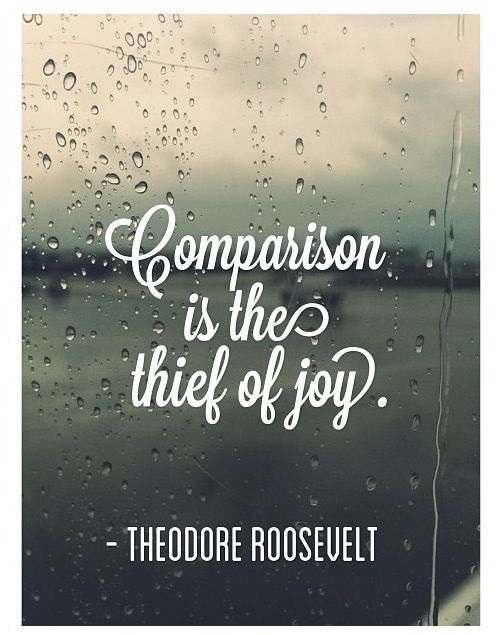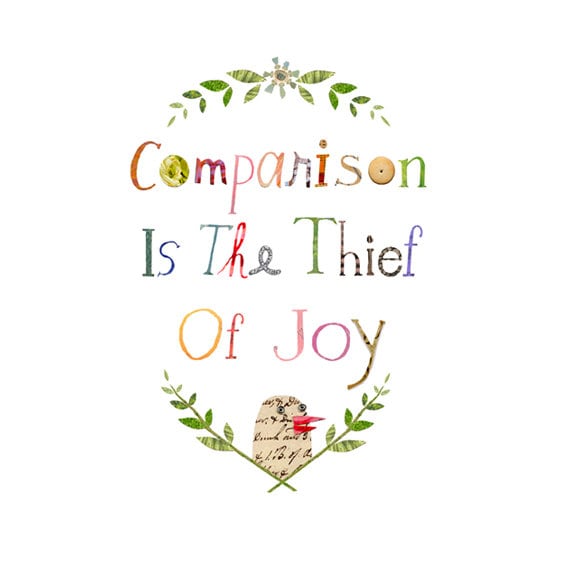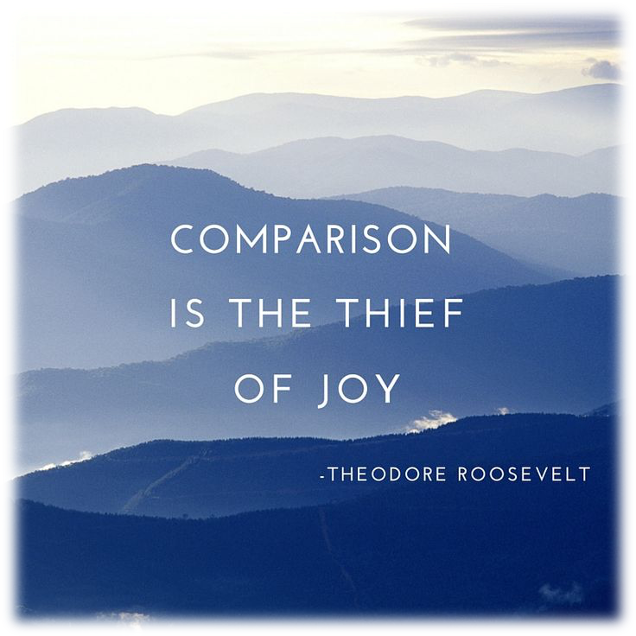It's impossible to avoid comparison these days with social media, the internet, and the constant access into people's lives. But, the comparison trap has been around long before Instagram. Instead, comparison can lead us down the path of suffering. I'm reluctant to start promoting the idea of comparing yourself to people who are worse off because there's something uncomfortable about it. I suppose being aware and grateful for the abundance in your life is a healthy way of making a strategic downward social comparison.
Reminding ourselves that, for better or worse, there are people who have less, who are in worse situations, who have it harder and who would take our lives and woes in a heartbeat. Downward comparisons can be great but can also be demotivating, denting ambition and drive. So naturally, at times, I made comparisons in the early stages.
It took me a while but I soon realized that these people are sharing their stories not to boast or to make make you feel inadequate – but to help you on your own journey. I think knowing intention is key to maintaining perspective and avoiding unhealthy comparisons. When a friend tells you about their new raise or new home, it's to share their joy and excitement with you – because you're important to them as they are to you. Bearing this in mind, this helps me take a step back when I feel that bitter envy start to rise up. If comparison is the thief of joy, perhaps the antidotes to that are looking at people, places, and things with realistic eyes, acknowledging we all have problems and flaws.
It may mean looking at our lived experience gently and with love, but letting go of an unrealistic ideal of perfection. Try and imagine this thought experiment for a moment …overnight something happens, wherein everyone you know and everyone you see is doing much worse than you. Your life is identical to how it is today though, same home, job, friends and possessions but you're now top of the pile. Your social media feed is awash with photos and stories of hardship. If you can immerse yourself in this thought for a small while then it's hard not to feel different. There's certainly no envy, most people would feel grateful and probably happier with their lot.
But your life is the same which goes to show how impactful compassion can be on wellbeing. Is comparison holding you back from living a life full of joy, happiness, and confidence? In this episode Lisa discusses why comparison is the thief of joy and how to stop comparing and start living a life that is full of joy and a life that you love. I hadn't heard that Roosevelt quote before but it rings very true. It's so easy to get caught up in comparing your life with others. For me, I sometimes feel the urge to compare almost getting stronger—even if it's less frequent—as I get older, almost as if I'm running out of time…just an ego thing certainly.
I find being mindful and meditating helps me out with the "want" and focus in on the positive comparison you write about. Who seems like they are having a better time at school than me? Why does this person have tons of friends and I don't? Why is X school letting people have more fun? But now I'm realizing that it's not categorically true. In fact, I use comparison all the time to boost my happiness and you can too if you follow two simple principles.
Most of the mental health issues that exist in society are because of comparison. People see others' lives on social media and start comparing themselves with theirs. What they don't realize is people are sharing what they want you to see, only sharing their luxuries and not the hardships.
Hikers on the Appalachian trail have the motto "hike your own hike"—that is, resist the urge to compare how many miles you cover in a day to how far other hikers are traveling. Nevertheless, the urge to make comparisons is strong. Our research has found that more than 10% of daily thoughts involved making a comparison of some kind. New research suggests that the ways that we make comparisons may give us a biased account of our own skills and experiences. Take a moment right now to reflect on your life and all the things you went through to get to this moment.
Consider the struggles, triumphs, and defeats that helped contribute and reform the powerful person you are today. Now ask yourself this simple question, does the success of others suddenly dilute yours or my accomplishments? We will save you the time, the answer is NO. It was once said, "Comparison is the thief of joy" by the late president Theodore Roosevelt. Your happiness can be rooted in many things but it should not be rooted in someone else's achievements.
Theodore Rosevelt's well known quote "Comparison is the thief of joy" explains how comparing your work, your life or whatever else will only serve to make you unhappy. We can become so fixated on what other people are doing, what they can do better than us and what they have that we don't, that we forget to enjoy the here and the now. We forget to enjoy the journey we are on as individuals, and what we do have. The only way we are going to be comfortable within ourselves and be confident in our own ability is if we focus on ourselves and our own potential.
Start paying attention to the situations or people that lead you to compare yourself to others. Yet, you may have friends and acquaintances that make you feel discontent with yourself. Think about whether comparing yourself to them is adding meaning or value to your life. If possible, cut back on social media if it is negatively impacting your well-being. It's also easy to compare the ownership of things and fall into the self-destructive habit of jealousy, which is never a healthy state of mind to be in.
Can you think of any highly jealous people that are happy, peaceful, and content? Again, when we approach this sort of comparison from a state of want or feelings of scarcity, we focus on the negative side. They say when we count other people's blessings instead of our own we're bound to make accounting errors. On the other hand, downward social comparison occurs when we compare ourselves to others who are worse off than us. Such downward comparisons are often centered on making ourselves feel better about our abilities or traits. We want nothing more than to be a guide on your journey, to rest easy with you as you reach your success.
Don't let comparison be the thief of your joy! When you reach the pinnacle of financial independence, I hope you look ahead to see it was only a plateau on the arduous journey of life. You may have reached the apex, but the journey continues. Now you are the positive example to those around you.
If scrolling through your social media timeline makes you sad, start unfollowing any and every account the moment you notice those negative thoughts. (If you feel like unfollowing isn't an option, mute, or hide them…there's ways to not see an account's posts without unfollowing them). However, avoiding comparison is easier said than done.
The ability to compare these days is so readily available and is almost acceptable in our society. At any moment of any day, we can pick up our phones and see a small moment of someone else's life, and as a result, we may think "Why am I not doing what she's doing? " or "I'm so much better than him." Either way, this thought process only harms us and can be seen as wasted energy since social media is a tiny snapshot of someone's lived experience.
Facebook or not, you'll still compare yourself to your colleagues, the people at church, or the people down the street. I've read that limiting your exposure to social media can certainly help reduce negative or sad feelings caused by comparison, so I won't argue that it can't help. An abundance mindset helps us think,"Ah, good for Jack! I'll get the next one."A scarcity mindset causes us to negatively compare ourselves to others and root against them, which only causes toxic, poisonous feelings, and resentment.
If you want to overcome social comparison, focus onconverting a scarcity mindset to one of abundance. One of the most common answers for overcoming social comparison and negative thoughts is tostart a gratitude journal. This practice can look different for everyone, but essentially, a gratitude journal is a place to write down 3-5 things every day that you're grateful for or that makes you happy. Most people only share the highlight reels of their lives. We live in a world where we stare at screens for large parts of the day, but we're rarely consuming content that makes us feel fortunate. Quite often we are referencing our life versus a paragon.
What a shame that so few people are interested in learning about history as it's clearly an antidote. I often use the example of child labour in Victorian times, most people are aware it happened but few realise how prevalent it was. Our lives in comparison are extremely fortunate. And this is the point Stephen Pinker and the late Hans Rosling made in Enlightenment Now and Factfulness, life is much better than the media have us believe. Theodore Roosevelt once said, "Comparison is the thief of joy," a statement that is undeniably true in parenting, in addition to life in general.
This lack of self-appreciation robs us of Light and leads to feelings of self-doubt, insecurity, anxiety, and even depression. This kind of negativity prevents us from connecting to the Light, an absolutely essential part of parenting with love and compassion. By the nature of the sport, being a runner easily results in comparison. Both types of social comparison can put our happiness, confidence, and mental health at risk. I always compared my current situation to what I had expected in the past.
And because I never expected to do particularly well my comparisons always led me to feel incredibly fortunate as my career and income soared. I never thought I'd be any kind of celebrity but I became a big fish in a small pond and again, that just seemed remarkable to me. I never expected to become rich, so my financial success seemed completely over the top. I suppose I could have compared myself to my friends with private jets and luxury homes all over the globe, but I never did that.
I just compared what I had to what I had expected to have, and felt absolutely lucky and grateful and astonished with life. So how do you break the Comparison is the thief of joy cycle? The second way is to be grateful for what you have - keeping a log of three things every day of you're grateful for is a great way to do this.
These can be big things like your health, small things like your breakfast or neutral things like the feeling of your feet on the ground as you walk. Taking joy in the world around you is the formula for a happy life. A few years ago, I came across a striking quote on the power of comparison. In one of his speeches, Theodore Roosevelt said "comparison is the thief of joy". We may be able to control how we speak to ourselves and how we praise ourselves, but we don't have control over other people praising us.
It's hard to avoid heading down the comparison trap when we receive praise from other people. It's important during these moments to say thank you, and then remind yourself that you are no better than the person next to you, just because you received a compliment. A great way to bring yourself back to earth is to think of other people who are better than you in the very thing you received a compliment for.
For example, because I've had a lot of education, people compliment my intelligence. To quell any sense of superiority, I think of all the people in the world who are much smarter than I am. This doesn't make me feel inferior or less than. It stops these compliments from getting to my head. So next time you receive praise or a compliment, I recommend gently reminding yourself that there are always going to be people better than you. The focus should be on how can I enjoy what I'm doing more, not how can I outperform others.
Aside from social media, there are many other opportunities to compare ourselves to others. We can compare how we look to other people when we're out and about. We can compare ourselves to neighbors and assess what we have vs. what they have.
We can compare ourselves to our relatives and what we've accomplished in our lives vs. what they've accomplished. Another common comparison scenario is comparing your work performance to your colleague's. This may in fact be encouraged by your company because they think that comparison can make people work harder and increase profits. It's a vicious cycle to get caught up in, whether you started the comparison game or not. God, help me to love the life you have given me right now. Show me the things I overlook and ignore because I am comparing my blessings to others.
Help me to be content with what I have and to find joy in the here and now. Forgive me for when I compare myself to others and I lose my focus on the good gifts you have given me. Help me to hold tight to my peace and joy - secure in your love for me.
Forgive me for looking for and longing for things outside of your will. You love me just as I am and my joy is found in you alone. What's awesome about all of this research is that they've found simple interventions can trigger powerful feelings of gratitude, which will at the same time boost happiness levels. In other words, if you deliberately increase your feelings of gratitude you will naturally make yourself feel happier. You don't have to get a better job or a nicer car or a newer shiny thing — you don't need anything but time to think and be grateful.
It's bad for mental health and addictive just like any other drug. I believe future generations will be shocked at how we allow children from an early age to get hooked with potentially irreversible consequences on their personalities. I sympathise with parents who have an impossible job. The age limit for Instagram and Facebook of 13 is absurd. Steve Jobs, Bill Gates and other Silicon Valley elites were on to something by limiting their children's use of technology.
Social media is a stage to flaunt our so-called "luxuries," combined with high expectations to earn big money and have a certain lifestyle. We end up being in this trap and start comparing ourselves with others. This is what comparison is the thief of joy meaning is. The problem with comparing ourselves to others and why it can be such a cause of pain is that we're never comparing like for like. We can only ever be experiencing our version of reality and never someone else's reality. What that means is that I might be looking at someone else's social media feed and see this wonderful life taking place.


























No comments:
Post a Comment
Note: Only a member of this blog may post a comment.